Hello, dear friends!
It’s here! Episode One/Season One of the Austen Connection podcast. You can press play and listen or stream from any device, and it’s also available (we hope) on Apple podcasts. Enjoy, and if you like it, share with your Janeite and bookish friends. Thank you for being here and joining this conversation!
One of the most exciting things about Jane Austen is how her stories travel - across continents, across cultures, across time. Like her spiritual brother Shakespeare, her stories contain a universality and also a lot of fun of the sort that works like a passport across these boundaries - and perhaps no one else but Shakespeare comes so close to providing us with stories that connect - if you will - so strongly today.
And one thing that a lot of us find exciting, as so many of us are questioning and exploring issues of race and inclusivity in all of our cultures - is how this author who is important to us is also important to so many of our sisters and brothers across continents and cultures. It’s just downright exciting.
So it’s a thrill to share with you a conversation that I had with the author of a book that happens to be a favorite Jane Austen retelling of a lot of Janeites, and scholars, and readers alike: Soniah Kamal’s Unmarriageable: A Novel.
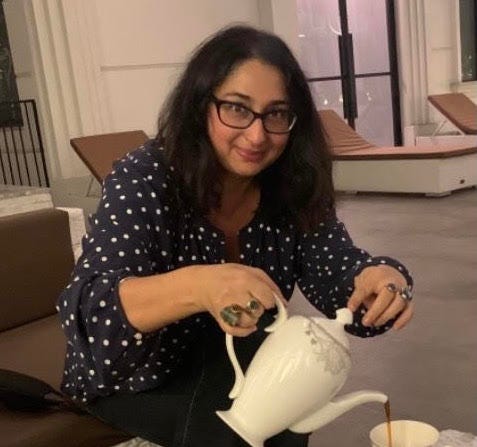
Unmarriageable tells the story of heroine Alysba, or Alys, Binat and the Binat sisters, who live in Pakistan, teach at an English school, and avoid getting married - that is until the arrogant, wealthy and handsome Darsee comes along and shakes things up. I think you know how this is going to go.
When I reached Kamal she was visiting Pakistan, the place of her birth. Growing up, she also spent time in England, Saudi Arabia and currently lives in Georgia. But in this conversation you could hear Pakistan - its streets and soundscapes - in the background.
Kamal and I spoke about why Mansfield Park is her favorite novel, how religious communities that teach Purity, from conservative Islam to Evangelical Christianity, make ideal contemporary settings for Jane Austen’s themes, and why she says that ever since she first read Pride and Prejudice at the age of 16 she’s always known that Jane Austen was Pakistani.
This is the first Austen Connection podcast episode - you can listen here and subscribe to the podcast on Apple.
Meanwhile, if you prefer words to sounds, here are edited excerpts from our conversation. Enjoy!
-------------------------------
Plain Jane:
Let me start with a really simple question: When did you first encounter the novels of Jane Austen? When and where and how have Austen and her stories shaped your life ever since?
Soniah Kamal:
I was first given Pride and Prejudice when I was, I think, around 12, 13, 14 ... by an aunt of mine. And what she gave me was, this was I believe, around the ‘70s. And she gave me a really beautiful red leather-bound copy with gold lettering on it. And I opened it up, and I read the first sentence, which is, you know, “It's a truth universally acknowledged …” etc, etc. And I promptly shut the book and said, “OK, I'm not reading that.” … And I remember thinking, “I don't know what this is, what I just read, I'm not reading this book.”
And then I think I was 16 when I finally opened the novel, and I like to joke It must have been a rainy day. But I don't know why I opened it. I started to read it, and I read it cover to cover. And it was a quintessentially Pakistani novel. I mean … it could have been set in Pakistan completely. I mean, Jane Austen didn't know she was Pakistani, and I actually started calling her Jane Khala in my mind - Khala means maternal aunt ... I just loved the novel. And I actually grew up in Saudi Arabia for a while and went to an international school there. And my library had books from the US and the UK … But the one thing that I never could find back then was a book written in English but set in Pakistan, and English is my first language. English is the official language of Pakistan, it became so in 1947, even though we know the origins of it are not that delightful. But reading Jane Austen at that [time] at 16 … what I started to do, in a lot of my reading was flipped settings and stuff. So like bonnets would turn into buttas, sandwiches would turn into scones and stuff. So when I read Austen at 16, it just seemed, you know, it didn't seem other … Which is why I say that it was a quintessentially Pakistani novel. My brain was already doing that, you know … So just seeing the dialogue, the scenarios, the characters, the concerns, the thematic material. And it's all very relevant to today.
Plain Jane
And that is what we do when we're reading novels. We’re using our imaginations to recreate our own world, which is what's so powerful about it. So funny to think about a young Soniah Kamal reading that first sentence that we love, “It is a truth universally acknowledged …” I have some teens in my life, and they have emptied my shelves of Jane Austen, because I press Jane Austen on them. But the thing I'm very careful to say, and you’re reminding me, as I always say, “She's sarcastic!”
Soniah Kamal
I think maybe that's what fascinated me, or at least definitely caught me was that … Yes, it's funny. But the humor is … sarcasm, you know, even the irony and sarcasm are closely related. And I think what I had sort of done to be able to survive myself in the society that I found myself living in, was sarcasm also.
So Austen, she was just perfect for me. Her wit, her quips, her social insights. But it wasn't just that she had social insights. ... And she has such an astute understanding of characters, of people. She doesn't mock people; she mocks institutions. And her irony and sarcasm are her medium - of her humor … and I really, really related to that. I really love that. But she wasn't making fun of people. She was making fun of the institutions and the ideas that had given birth to these people.
Plain Jane
Let's tackle that. I mean, she's not just funny, not slapstick funny, as you say, right? She's wickedly funny because she's taking on these incredible institutions. And she's demanding to be listened to. … Soniah, you tackle a lot of themes in the first few pages of Unmarriageable - I could see that you were tackling so many of the themes that people don't actually associate with Austen: Things like you've just mentioned, like class oppression, gender oppression, hypocrisy of society, things that were not only annoying to women in the Regency era, and in Jane Austen's world, but are dangerous - and are still dangerous today. And really, it's all right there in Unmarriageable in the first few pages. So tell me about how conscious this was for you.
Soniah Kamal
It was very, very conscious. In fact, what I wanted to do with the first chapter was set up all the thematic material that I felt was in Austen, as well as in Unmarriageable. And Unmarriageable works on two levels. It's a completely stand-alone novel. So if you know nothing about Jane Austen or not coming from Pride and Prejudice, it's still a stand-alone novel in its own right. However, it's also an homage to Pride and Prejudice. I mean, it's a postcolonial parallel retelling, and parallel because it follows the original plot and all the characters are there. And it's a postcolonial retelling because I was trying to remap the linguistic history of British Empire. So this was very much a project for me, rather than just something fun that I thought I would do, you know. And I was very intimidated by what I was setting out to do. I don't know if there's any parallel retelling actually out. I haven't come across one -I think this may well be the first one. But because I was taking on British Empire and postcolonialism also, that was intimidating.
I was very intimidated by what I was setting out to do. I don't know if there's any parallel retelling actually out. I haven't come across one -I think this may well be the first one. But because I was taking on British Empire and postcolonialism also, that was intimidating.
So on these two levels, I had to satisfy two different groups of readers which are polar opposite - coming from Austen, and not knowing Austen at all. And what I brought for the Austen readers though, what I definitely wanted to do was put easter eggs throughout the the narrative, and they're actually nods to all of her six completed novels as well as Lady Susan. And the very first line, my opening for Unmarriageable is a nod to Pride and Prejudice. And those rewrites, those reimaginings, retellings of her iconic first sentence, continue in the first chapter.
But also my favorite Austen novel is actually Mansfield Park. And I think the opening for Mansfield Park is fantastic because it just encapsulates what traditionally, and for centuries, women's lives actually were, which was the ring that your finger wore ended up determining your life and the life of your children, your opportunities, your privileges, and Austen depicts that. … A lot of people don't like Mansfield Park. Like when I say it’s my favorite, sometimes I get very odd looks, like, “What's wrong with you?” ...
Plain Jane
Yeah, I'm so with you. And that's the one that I tend to press on my teenagers because I say, “Look, this is about a group of young people stuck in a house together.”
Soniah Kamal
You know, yes. Interesting. It's so interesting, I've never really thought of it like that. …I mean, the beginning, the opening of Mansfield Park are three sisters. And because of who they end up married to - one of them, you know, lies about on the sofa all day long with her dog; the other one needs to suck up to the owner of the mansion; and the third one has to send her kids away because she can't afford their upbringing. And they've all grown up in the same environment. They're sisters; they've come from the same family; but look at what happened to their life, just by dint of who they ended up getting married to.
I think the opening for Mansfield Park is fantastic because it just encapsulates what traditionally, and for centuries, women's lives actually were, which was the ring that your finger wore ended up determining your life and the life of your children, your opportunities, your privileges …
And in a lot of traditional cultures, that is still the case. You know, and I'm coming from Pakistan where I see this - saw this then, see this today. And I think what I absolutely loved in [Mansfield Park], it was the first time that I had read a novel where family relationships - in Pride and Prejudice and Emma, etc. … are what Austen really picks apart .. the people visiting and … what is it “one and 20 families” and stuff. But in Mansfield Park, like you said, she keeps this group of people in the house. And what she picks apart are relatives and family relationships and what family means. I think I fell in love with that novel because it is by far one of the realest novels … the most honest novels I have still read about what it means to be and to belong to family. You know, just because .. people are your cousins, just because they're your mother, sisters… it doesn't mean anything. They can still be unkind and cruel. And I think Austen is so amazing for what she's done with Mansfield Park.
Plain Jane
…And you know everything you were saying Soniah, makes me realize I think a lot of people mistakenly sort of, you know … all of our feminist colleagues and friends, I think sometimes might have the question, “What's relevant about Jane Austen?” And I think maybe that's because with the [screen] adaptations, you think that these are novels about marriage. But really, it's about the precarity of women, and that marriage was the option. Marriage was so important for the reasons you're saying.
Soniah Kamal
I mean, yeah, in Regency England and Austen's time, marriage was the only thing women of a certain class would do. I mean, if you came from the servant classes, you could perhaps gain employment as a cook as a maid, etc. But from Austen's own class, you couldn't do that, the only option you had was to become a governess … So you're very in-between; you were neither here nor there. And Austen doesn't seem to be too happy about that. So Regency England was harsh on women…
Plain Jane
… and harsh on Jane Austen!
Soniah Kamal
Right but she chose those for herself insofar as she said no to Harris Bigg-Wither. … So it's really interesting to see that off the page [and] on the page. … I think that the worst thing per se was once you got married, any property you brought, your kids, everything - you yourself - belonged to your husband. You were their property.
So … saying Yes to someone wasn't just a question of, “Oh, are we going to get along and have lovely strolls …” It was, if you didn't get along with this person, or if he was cruel or horrible, you were in a bad position as a woman. And the fact is, as we know, with a lot of relationships, things don't stay static; people change.
So women, the precariousness of a woman's position in her home, or in her husband's heart, or wherever the hell, in Regency England, was not a fun place to be at all. Because they had no power. They lacked complete agency per se.
Plain Jane
But the thing that I love, that you mentioned, [is] that Fanny and Eliza and Austen's characters are very astute, and I think that's really, really important in these characters - They're judging us. People are judging each other constantly. And the biggest, and harshest judges are Austen's leading ladies and leading men. They are the smartest people in the room. And you really capture this and I feel like, in a way, Austen, I feel like Pride and Prejudice upends Regency values. … And you have your characters [in Unmarriageable], Alys and Darsee, are the smartest people in the room. They're the judgiest two people in the room, and they judge each other. And there's always this opposition. But that's how in these precarious positions women survive, is by being excellent judges of character and of their situations, and also being honest.
Do you find that?
Soniah Kamal
.... Well first, I think it's interesting that you said, you know about pre-judging and everything, because the thing is Pride and Prejudice is prejudice. … When you break the word apart, it's pre-judge. ...You're pre-judging everyone. And that's exactly what Elizabeth does. But you know, I find, I think for me, Sense and Sensibility, Lucy Steele, the Steele sisters, but especially Lucy - I personally think out of all of her novels, Lucy is the most astute in many ways ...
Plain Jane
… and you're reminding me while I'm over simplifying it, in many ways, for brevity, really, there's so many nuances to her characters.
Let me ask you a little bit about the characters in Unmarriageable. I love it that, you know, there's always this opposition between the leading man and the heroine that we know need to end up together. And so much suspense is created out of that. And there's so much opposition between them, but at the same time, the reader is allowed to see things that they might have in common.
And all of this is in Unmarriageable as well. But it's interesting, what you choose to make Darsee and Alys understand about each other, is there's a sort of global citizenship, the fact that they've had this. And then they've had this postcolonial education .... Very English-first, in so many ways. And Darsee says something very interesting. He says, “We've both been educated on the ‘literature of others.’”
What did you mean by having Darsee say this and having this as being the thing that the two-people-about-to-fall-in-love have in common?
Soniah Kamal
My own background came into my mind. I was like, “OK, you know, they’re third culture kids, and they've grown up overseas. They've gone to international schools, and this is what they'll connect over.”
And I think partly it wasn't just the ease of knowing this world because I come from it, but also because it was very important for me in the landscape of Unmarriageable. Because Unmarriageable is very much an East-West, East-and-West-come-together book. … You know, there's a line in one of Kipling's poems, where he says, you know, “East is East and West is West, and never the twain shall meet.” I think in Unmarriageable they definitely do, and very purposefully, because of British Empire.
In fact, one of my epigraphs is by Thomas Babington Macaulay ... from his 1835 speech to British Parliament in which he's recommending that English replace all the indigenous languages as the official language in Empire. And that is what ended up happening, and therefore English became the language of privilege, power, opportunity.
So, because English became this major, important language, everyone aspired to learn it. The twist comes when, in 1947, British Empire left the Indian subcontinent and Pakistan and India became sovereign countries. Pakistan retained English and declared it as one of its official languages. So English is very much a Pakistani language. However, it happens to be one of the only languages, it's actually the only language I can speak fluently for the most part. … And I did not know the origins of this language that was coming out of my mouth. I happened to come across Macauley’s speech … doing some extra reading for myself. And it was really, it was really disturbing to see, to say the least, because as I say in my epigraph, what he wanted to do was create confused people who are brown in skin but white in sensibilities and basically create confusions ....
Plain Jane
Yes, and what you're saying - because I did read your epigraph as well, and I had a question for you - that must have been incredibly disturbing. And what he was talking about actually was education, right? You quote him as saying English is better worth knowing than Sanskrit or Arabic. So yeah, I think that's astounding and really needs to be pointed out - that this was creating, like you say, chaos, but also privilege - creating layers of privilege ...
Soniah Kamal
… Definitely. And we see that in contemporary Pakistan also, because one of the themes in Unmarriageable is the class divide between those who come from an English-fluent, English-language background with … what is considered proper accents … versus those who are not.
But the thing is, reading that, reading [Macauley’s] essay, reading the origins of this, it was, I mean, ...disturbing is an understatement. And I think for the longest time, I couldn't read that quote out loud without just tearing up.
But the fact is that English is the official language in Pakistan, and I wanted to fuse the language that is mine and the culture that is mine.
And really, a lot of Unmarriagable came from that desire. And actually a professor of mine at Seattle University called Unmarriageable Macauley’s worst nightmare. And I don't know if there can ever be a compliment to top that. Because as British subjects, even postcolonial, you were supposed to look up to everything white and British. … And I guess I did flip the narrative on that one, which was the reason for writing it.
Plain Jane
And, you know, Darsee and Alys in Unmarriageable are big readers, and your novel is really a celebration of books. And it's a celebration of the English writers that you and Darsee will have grown up with, but also a celebration of Indian and Pakistani writers. As you mentioned to Callie Crossley on WGBH, you hear often that people are encountering and discovering Jane Austen through Unmarriageable and the first time somebody said, “Oh, I loved Unmarriageable, I'm going to check out Jane Austen,” you burst into tears!
Soniah Kamal
… This is where with empire and countries who have privilege and neocolonialism … what happens is that whereas empire and those of us who are brought up on British literature are aware of Austen and Hardy and Dickens, etc. Someone who wants to flip that will not necessarily, I mean, the general public in certain countries will not be aware of the Pakistani writers and stuff. And in fact, I think Darsee, that's what I think Darsee says at one point, which is … “Will there ever be someone doing that actually?” And that's where power structure comes into play. And that's where sort of pop culture and soft power and dominance, domination happens. And that's exactly what Macaulay meant when he meant “brown in skin, but white sensibilities,” which is that these people will grow up on everything British - British literature … Darsee saying “literature of others.” The fact is, I have grown up on British literature and it's very much mine too. But it was supposed to other me from myself. Because having been brought up in English I was not able to really read things set within the culture itself, which is why I had this burning desire to to read a piece of literature which I'd grown up with, within my own cultural paradigm.
The fact is, I have grown up on British literature and it's very much mine too. But it was supposed to other me from myself.
So all of this comes into play - just identity politics, and who gets to decide how they're going to change people's identities. All the novels and all the short stories that I've mentioned in Unmarriageable reflect the theme of Unmarriageable and the theme of identity.
I think the one that encapsulates it the best for me is the Native American writer Leslie Marmon Silko. I think Alys makes her students read her short story, “Lullaby.” “Lullaby” is about children who are taken from Native American tribes by white settlers who had come in and sent [them] to boarding schools, and they were not allowed to speak their tribal languages. They were not allowed to wear their native tribal dress. I believe they had to cut their hair. They did exactly what Macaulay tried to do, which is “brown in skin, but white in sensibility.”
And Silko’s story is so beautiful, because she talks about what happens when you strip away someone's native identity and try to make them other, and what you do to their souls.
...I wanted to do something which fused this language which is mine, within the culture. So I wanted to do something “light and bright and sparkling” with it. Even though it's very, very heavy, and can be very troubling.
Plain Jane
It's, it’s everything. And, you know, I love that you say Jane Austen is mine and Jane Austen belongs to everyone. You mentioned that someone said to you, Sir Thomas Macaulay would roll over in his grave … or it would be his worst nightmare.
But you know, Jane Austen would have celebrated it and loved it. So, you know, we have Jane Austen's permission.
Soniah Kamal
I hope so. I hope so. … I think she would have chuckled.
Plain Jane
What would you like the Janeite community to keep in mind to make … the discussions about Jane Austen more inclusive? What should people keep in mind when reading and having these conversations?
Soniah Kamal
I think it comes down to the readers being aware of the space that Austen is writing in, and what she's writing. And for me, [the books] have always, with their thematic content … been universal across time and centuries. And, just as a writer, she has a certain modern way of writing. You know, she doesn't, unlike Edith Wharton, or unlike Dickens, she doesn't … preach. And she doesn't go off into long pages of descriptions and stuff. She's a very modern when it comes to pacing ...
Plain Jane
Interesting, so I hear what you're saying - that there's so much universality to pick up and to explore.
Soniah Kamal
There is, which is why I think with Janeites and with the Austen communities … Austen has a lot to offer readers from all communities and … anyone can read her and find something of worth and merit.
Plain Jane
You know, you have managed to write, with Unmarriageable - you called it a parallel retelling - a scene-by-scene retelling, which is fascinating. In some ways, that's a challenge, just to show you can do this scene by scene, even though we are in Pakistan, for this story. And we are, you know, in the early 2000s, I think for most of the story. So we can go across centuries and continents, and still do a scene-by-scene retelling with all the right characters, including Wickham… in Pride and Prejudice.
But you also introduced some fascinating [contemporary] things. You introduced some body image concepts, lots of talk about premarital sex, abortions, and also colorism ...I would love to hear you talk about these contemporary themes and also your experiences that also go into this very, very close retelling.
Soniah Kamal
I always meant to do a retelling because for me, like I said, this was a postcolonial writing back to empire. Remapping empire and its legacy. … So a scene-by-scene retelling is is very difficult because contemporary Pakistan is definitely not Regency England. And anyone who says that does not know what they're talking about as far as I'm concerned.
Because in contemporary Pakistan women can get educated; … There are women across the board in all sorts of jobs; you can get a divorce, you're not stuck. You're literally not stuck, jobless. … Yes, there is a bit when it comes to morality, because Pakistan and Regency England still expect its women to be good. And you know, but I always think of it in terms of Evangelical Christianity, which also expected its women to be pure, you know ...
Plain Jane
Let me jump in there and say that I grew up in Evangelical Christianity, and … that is absolutely a contemporary parallel. And something relevant about Jane Austen's world. [And] it's relevant to my world in the 1980s and 1990s.
Soniah Kamal
Even today, even today! I mean, Pakistan very much has its own purity culture, where good girls are expected to, you know, uphold certain morals. And if you don't do that, you can get into big trouble.
And so thematically, doing a parallel retelling for me was very easy, because the morality in which Austen's characters function is very much the morality even today in which Pakistani women are supposed to function. Or at least thrive the best.
And if you don't, ... like me, if you're opinionated, if you talk back, if you ask things like I would ask my Dad, “Well, you know, what's wrong with smoking? If you can smoke? Why can't I? Why can guys go out at this time at night? And why can't I?” You know, just to give it just to give very teen-agey examples.
So this material, I think, especially with more traditional societies and more religious societies, definitely, definitely resonates.
—-
Thank you for listening, friends! As always, talk back to us.
Wherever you’re reading from right now, how do Austen’s stories connect with you? Let us know! Comment below, or write me at austenconnection@gmail.com, at @AustenConnect on Twitter, or austenconnection on Instagram.
And if you’re not yet part of the Austen Connection community, join us with a free subscription, to get every podcast episode and conversation dropped right into your inbox.
If you liked this conversation, feel free to share it!



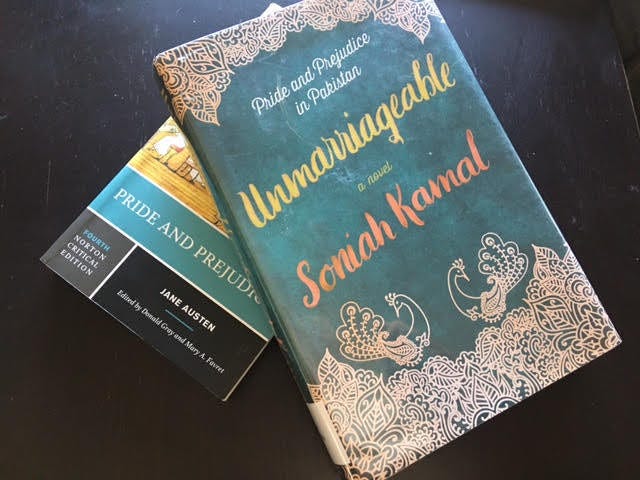

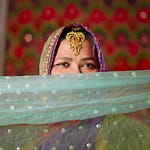




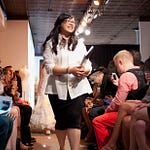
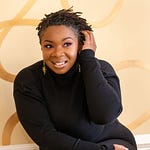

The Podcast - Episode 1: Author Soniah Kamal on how Jane Austen is Pakistani